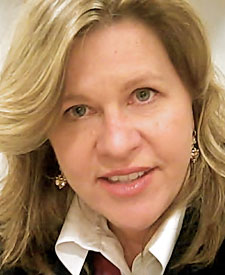


Professor of Communication, Temple University
Renee Hobbs is founder of the Media Education Lab at Temple University. Hobbs works to promote media literacy and critical thinking about information sources-which can be a powerful tool against hate speech and Holocaust denial.
RENEE HOBBS:
When it comes to the lies and misinformation that's available about the Holocaust, unless you have a lot of background knowledge, unless you're already pretty knowledgeable, it's challenging to figure out what's accurate and what's inaccurate.
ALEISA FISHMAN:
Renee Hobbs is a professor of communication and founder of the Media Education Lab at Temple University. Hobbs works to promote media literacy and critical thinking about information sources—which can be a powerful tool against hate speech and Holocaust denial.
Welcome to Voices on Antisemitism, a podcast series from the United States Holocaust Memorial Museum made possible by generous support from the Oliver and Elizabeth Stanton Foundation. I'm Aleisa Fishman. Every month, we invite a guest to reflect about the many ways that antisemitism and hatred influence our world today. From Philadelphia, here's Renee Hobbs.
RENEE HOBBS:
Well, first probably, it's important to define what is media literacy and what does it mean to be media literate? And one of the reasons why media literacy is such a useful tool to combat hate is that being media literate involves both accessing information and ideas; critically analyzing information and messages that come to us from a variety of sources; communicating messages ourselves as authors and as creative people; and taking action—both individually and collectively—to use the power of communication to make the world a better place. So media literacy encourages people to think about a variety of different points of view, to think about why some messages are attractive and others are unattractive, to be reflective around the choices we make; and all of those practices are really powerful antidotes to the kind of biased thinking and one-dimensional, knee-jerk, acceptance of ideas without really thinking about their imbedded assumptions or reflecting on them.
When you're nine, one big media literacy challenge you face is about stereotypes, because by the time you're nine, you're really actively using movies and music and TV shows to figure out what people are like. For children and young people, long before they ever have any direct real experience with the world, they have media experiences with all manner of people, occupations, settings, places, historical circumstances. But media messages are always selective and incomplete. So we have to ask, whose point of view is represented? What economic context is shaping this message? What's the author's purpose, why are they telling me this story? And the most important, what's left out? Because media makers make choices and so awareness of choice opens up opportunities for people to question the assumptions. So people might recognize an antisemitic message built into that coverage of something that's going on in Iran, or something that's going on in the United States, or something that's going on in Israel. They might be able to better recognize those forms of prejudice as they are able to recognize how messages are constructed.
People have different comfort levels with complexity. And media literacy educators are aiming to increase people's tolerance and appreciation of complexity. People tend to generally believe that if a website matches what they already know and believe, then therefore it must be true. So we tend to believe things that match with our existing worldview. And we think that the more self-reflective and aware people are about that process, the better.
And the ability to sort out truth and beauty from lies and hate is built in to the structure of what it means to be a citizen in the United States. The First Amendment protects hateful speech and that's because the view of human nature that is embodied in the concept of self-governance is that people are able to make choices. The reality of it is, I have to decide what's worth believing and my ability to be effective in the world is because I make choices about what I choose to believe and why I choose to believe it.
So it turns out that, from my point of view, media literacy tends to make you more optimistic about media and popular culture and digital media. And in some way, we have to be optimistic in order to address the problem of hate speech, don't we? We have to be able to believe that through our own power as effective communicators, we can respond, to counter the worst aspects of human experience—our greed, our laziness, our hate.
ALEISA FISHMAN:
Voices on Antisemitism is a podcast series of the United States Holocaust Memorial Museum. Join us every month to hear a new perspective on the continuing threat of antisemitism in our world today.
We would appreciate your feedback on this series. Please visit our Web site, www.ushmm.org, and follow the prompts to the Voices on Antisemitism survey. At our Web site, you can also listen to Voices on Genocide Prevention, a podcast series on contemporary genocide.